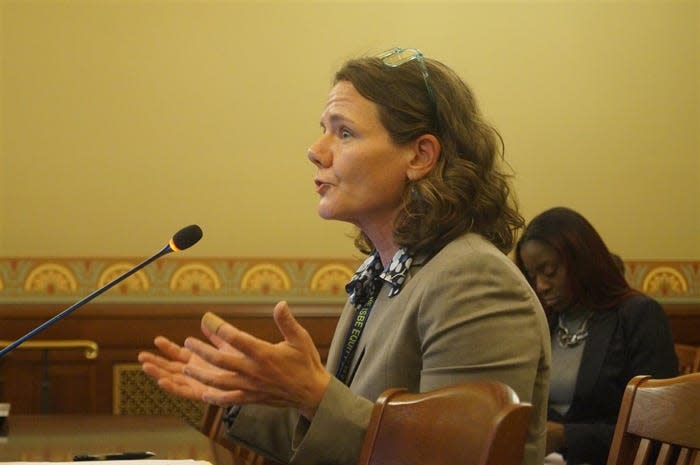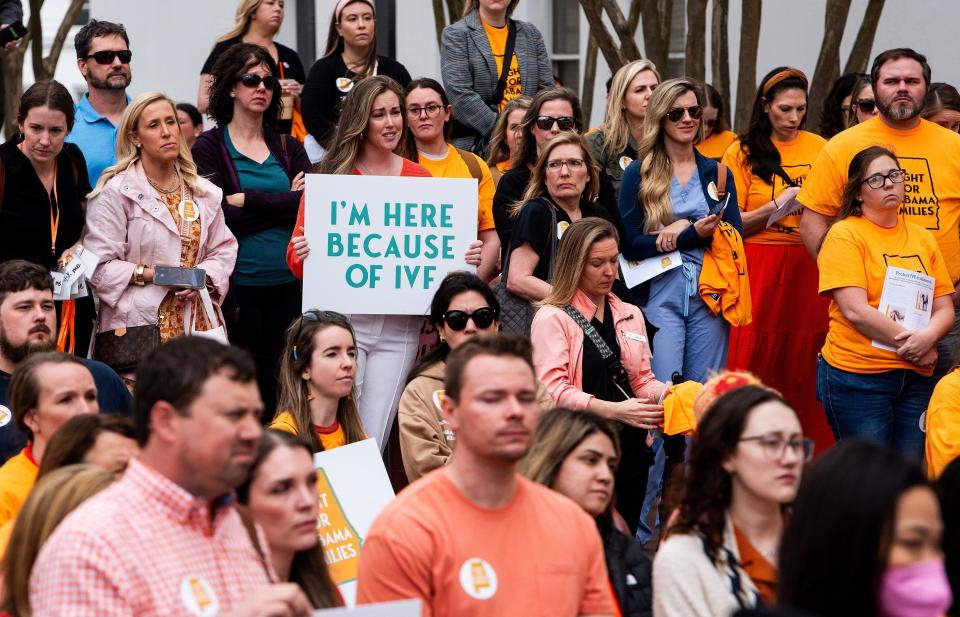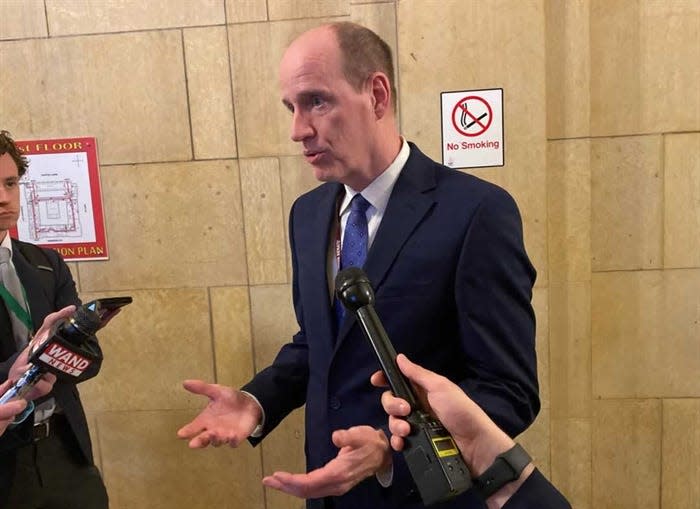Illinois Senate passes more than 200 bills during deadline week. Here are 4 key takeaways
- Oops!Something went wrong.Please try again later.
- Oops!Something went wrong.Please try again later.
The Illinois Senate wrapped up a busy week in Springfield, advancing a total of 244 bills before a Friday deadline.
From addressing the mishandling of human remains at a Carlinville funeral home to establishing a new state mushroom — the Calvatia gigantea or commonly known as the giant puffball — the bills now move to the House.
More: Higher diaper prices are impacting Illinois families. How is the state responding?
Here's what you need to know.
New state department

Most of the oversight for early childhood programs in Illinois are split amongst three different agencies which makes it harder for families to find and gain access. Legislation advancing in the Senate would open up a new department and combine all of the resources and services into one department.
Senate Bill 1, sponsored by Sen. Kimberly A. Lightford, D-Maywood, will create a new state agency, the Department of Early Childhood focusing on managing early childhood education programs and creating easier navigation for parents and providers.
Lightford talked on April 12 about the need for the department and how it will be more beneficial overall for the state and for families. Gov. JB Pritzker is a proponent of the new department, requesting $13.1 million in the budget for the upcoming fiscal year to fund its creation.
“Uniting early childhood services in Illinois will make access to services simple, better and more fair for families and children and make more efficient use of state resources,” said Lightford, her bill receiving bipartisan support.
The new agency would also take on the responsibility of the Early Childhood Block Grant which funds the Preschool for All initiative and the Prevention Initiative.
Medical debt
Millions of Americans are dealing with medical debt, reaching more than $220 billion according to a recent survey. The debt can saddle families for years, as Springfield resident Kimberly Moore attests.
Twice diagnosed with cancer and now undergoing therapy, she described her debt as "out-of-this world."
"I just try to juggle what I'm going to buy this or buy that prescription," Moore said during a press conference earlier this week.
Senate Bill 2933, passing in the Senate unanimously on April 11, would prohibit a consumer reporting group from using a person's medical debt when creating their credit report. Bill sponsor Sen. Steve Stadelman, D-Rockford, said this form of debt does not paint an accurate picture on someone's credit history, these expenditures often of their control. Fellow Rockford Democrat Rep. Maurice West will lead the bill in the House.
Pritzker is also requesting lawmakers to approve a plan eliminating $10 million medical debt in the upcoming fiscal year.
Insurance coverage of IVF

In vitro fertilization protections has become a hot button issue since the Alabama Supreme Court defined embryos created through IVF as children. Legislation advancing unanimously in the Senate would guarantee insurance coverage for medically prescribed infertility treatments.
Sen. Michael Hastings, D-Frankfort, said during floor debate Friday that his legislation, Senate Bill 2639, was filed before the Alabama ruling. Many families struggle with infertility and he sees his bill as a way to help them receive treatment.
“They endure countless doctor appointments, invasive procedures and heart-wrenching disappointments," Hastings said, his daughter born through IVF. "But through the miracle of IVF, families are blessed with the opportunity to welcome children into their families."
Through the legislation, licensed physicians would have the to approve procedures based the covered patient's medical, sexual, and reproductive history, age, physical findings, or diagnostic testing. They would also no longer be required to complete treatments they feel are ineffective.
While encountering no difficulties in Springfield, attempts to ensure federal IVF protections have encountered roadblocks. U.S. Sen. Tammy Duckworth, D-Ill., tried moving a bill that would grant access nationwide, but Republican opposition denied its passage.
Biometric Information Privacy Act reform

At the behest of the Illinois Supreme Court, the Senate amended a 2008 law that’s led to several multi-million-dollar settlements with tech companies over the collection of Illinoisans’ biometric data.
Sen. Bill Cunningham, D-Chicago, said the high court's decision last February inspired his legislation amending the Biometric Information Privacy Act. In a 4-3 decision, the court found fast food chain White Castle violated BIPA each time its employees used their fingerprints in the course of performing their jobs.
In that case, White Castle estimated it would be on the hook for up to $17 billion in penalties as the law provides for $1,000 in damages for “negligent” violations or $5,000 for “reckless” or “intentional” violations.
Senate Bill 2979, which passed 46-13, would change BIPA’s violation accrual so that each initial collection of a fingerprint or other biometric data would amount to one violation, rather than a violation occurring for each individual scan. Employees might scan their fingerprints dozens of times per shift if they’re unlocking doors or cabinets with those scans.
More: Tax Day is approaching: Be on the lookout for shady, unscrupulous preparers
Illinois is the only state that grants residents the right to sue over businesses’ improper collection and mishandling of biometric data – whether they are an employee or a customer. A business can violate BIPA by not getting written consent from customers or employees for the data being collected, not having a storage policy in place or not properly protecting the data.
Business groups have been clamoring for changes to BIPA in recent years as upwards of 2,000 lawsuits have been filed under the law since roughly 2018, resulting in a few high-profile settlements – including a $650 million class-action payout from Facebook in 2020. The social media giant paid more than 1 million Illinoisans roughly $400 each.
Business groups have been divided on Cunningham’s proposal, with some offering full-throated support after the bill’s passage on Thursday and others pointing to continued opposition.
Senate Minority Leader John Curran, R-Downers Grove, noted the split before he ultimately voted for the bill, but said he sided with the industry groups that support it.
“I think they see it the way I see it,” Curran said. “While I wish there was more in this…to do nothing leaves Illinois businesses subject to really annihilistic judgments.”
After SB 2979 passed through a Senate committee last month, a coalition of influential industry groups said it didn’t go far enough, especially because it wasn’t retroactive and wouldn’t help companies that have already been sued under BIPA.
Additionally, in recent weeks, advocates for Illinois’ burgeoning data center industry have registered concern that Cunningham’s bill doesn’t specifically shield data centers from liability for storing biometric information on behalf of companies who may have violated BIPA.
Hannah Meisel of Capitol News Illinois contributed to this report.
Contact Patrick M. Keck: 312-549-9340, pkeck@gannett.com, twitter.com/@pkeckreporter; Contact Hope Gadson: hgadson@gannett.com
This article originally appeared on State Journal-Register: Illinois Senate passes 200 bills. Here are 4 key takeaways

